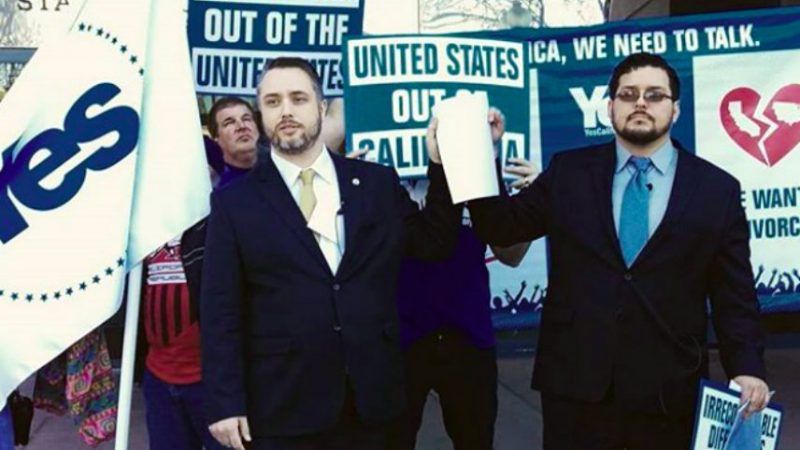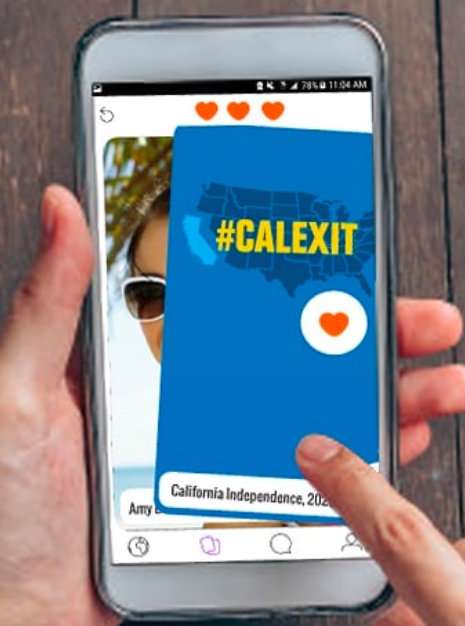If Californians Want to Secede, Americans May Be Ready to Let Them Go
There's growing tolerance for splitting off chunks of what our social studies teachers insisted was an "indivisible" union.


If Californians want to secede from the union, they're unlikely to get much pushback from their former countrymen, recent polling finds. That's good news. In a country in which political disagreement makes people enemies rather than opponents, carving up the real estate probably offers a better path to peaceful dispute resolution than elections that threaten to put losers at the mercy of their mortal foes.
Determined to show the way to a balkanized and—presumably—better future, California secessionists have yet again reworked their proposal for an independent progressive republic. The latest iteration includes a homeland for Native American tribes, based on the model of Greenland, which is semi-autonomous under the flag of Denmark. (A sizeable minority of Californians seem interested in the idea.) The secessionists also shifted gears strategically, arguing that it will be legal for them to cut ties with the U.S. if a majority of other states agree. They argue that Republican-controlled legislatures would be happy to push the Democrat-run state out the door.
They might well be right about that. Red Tribe lawmakers would likely be thrilled to see the impact of all of those Blue Tribe votes withdrawn from the electoral college, along with two Democratic Senators and an overwhelmingly Democratic delegation to the House of Representatives.
But the secessionists should also be heartened to know that Americans at large would likely greet their departure with fruit baskets rather than a unionist army. A "plurality of Americans"—39 percent—"agree with a state's right to make a clean break from the Federal Government and go their own way," Zogby revealed last month after a poll of 1,001 likely voters taken in early July. Only 32 percent said they "would support a military intervention to suppress a state's attempt to break away," with 29 percent saying they weren't sure.
Zogby found essentially identical results in a similar poll conducted last year. But support for letting secessionists go their own way has almost doubled in the 10 years since 22 percent of Americans agreed that "any state or region has the right to peaceably secede and become an independent republic" in a 2008 Zogby poll.
Why the growing tolerance for splitting off chunks of what our social studies teachers insisted was an "indivisible" union?
Ten years ago, when that earlier Zogby poll was taken, political division in this country were tense and escalating but hadn't yet reached the animosity of the present "cold civil war," as it's been described by observers including journalist Carl Bernstein and Angelo M. Codevilla, professor emeritus of international relations at Boston University. It's par for the course, now, for losers to assert that electoral victories are illegitimate, as Democratic National Committee Chairman Tom Perez has of Donald Trump's unexpected presidential victory—and as Trump himself did of Barack Obama's presidency.
"The country has never seen anything like the last 23 years, during which three presidents have had their legitimacy constantly under challenge, with an accompanying rise in polarization," George E. Condon Jr. wrote for National Journal in 2016.
You can make that four presidents, now.
There's a good reason for those legitimacy battles. Elections are for political opponents who disagree with the competition. America's political battle lines now feature political enemies who hate the competition.
"Democratic and Republican voters…despise each other, and to a degree that political scientists and pollsters say has gotten significantly worse over the last 50 years," Emily Badger and Niraj Chokshi wrote for The New York Times in 2017.
"While partisan animus began to rise in the 1980s, it has grown dramatically over the past two decades," Shanto Iyengar and Masha Krupenkin, political scientists at Stanford, reported in a paper published earlier this year. And as that tension has grown, "hostility toward the opposing party has eclipsed positive affect for ones' own party as a motive for political participation."
That political hostility is expressed on the street and in the media—but its ultimate expression is through control of the power of the state. And the state has an enormous amount of power to reach into every area of human life, not only to enact policy, but to punish enemies.
Law itself can be weaponized—a task increasingly easy when lifestyle preferences correspond closely with partisan affiliation. Want to punish the other political tribe? Go after the things they like to do, the places they live, and the ways in which they earn their keep.
"What we can do is to make the environment here so unwelcoming that some will choose not to come, and some may actually leave," snarled a former New Hampshire Democratic state representative who disliked the libertarian Free State Project that's been migrating to the Granite State. She added, "One way is to pass measures that will restrict the 'freedoms' that they think they will find here."
Or you can wield the agencies of the government as bludgeons, using the IRS, the FBI, and regulatory agencies against those with differing ideas and affiliations. Tax agencies have long been abused this way, because of their inquisitorial powers. But regulators now lean on private businesses to sever ties with disfavored individuals and organizations to isolate them from money and support.
Losers in each election get to anticipate being on the receiving end of the vast state apparatus.
We could consider decentralizing political decision-making and stripping government of much of its power. Lowering the stakes that way might not make the political tribes like each other any better, but it could make their mutual contempt less desperate, since it would reduce the degree to which they inflict their political will on one another.
Frankly, I'd be pleased to see the institutions of government reduced to pleasant, poorly-attended museum exhibits. Nobody is afraid of historical dioramas. But I may be shooting high when there's so little evidence that Americans are willing to pare back the dangerous power of the state to any significant degree.
As it stands, a powerful state and deeply hostile factions threaten to keep turning each political dispute into a knife fight. If American political life is to be nothing more than a scramble in a locked room for control of a blade, why not consider opening the room's doors?
Let California out—along with anybody else who wants to go. Americans seem to be picking up the idea that, with a few more political borders in place and less chance of being subject to enemies' whims, we'll all get along so much better.


Show Comments (283)